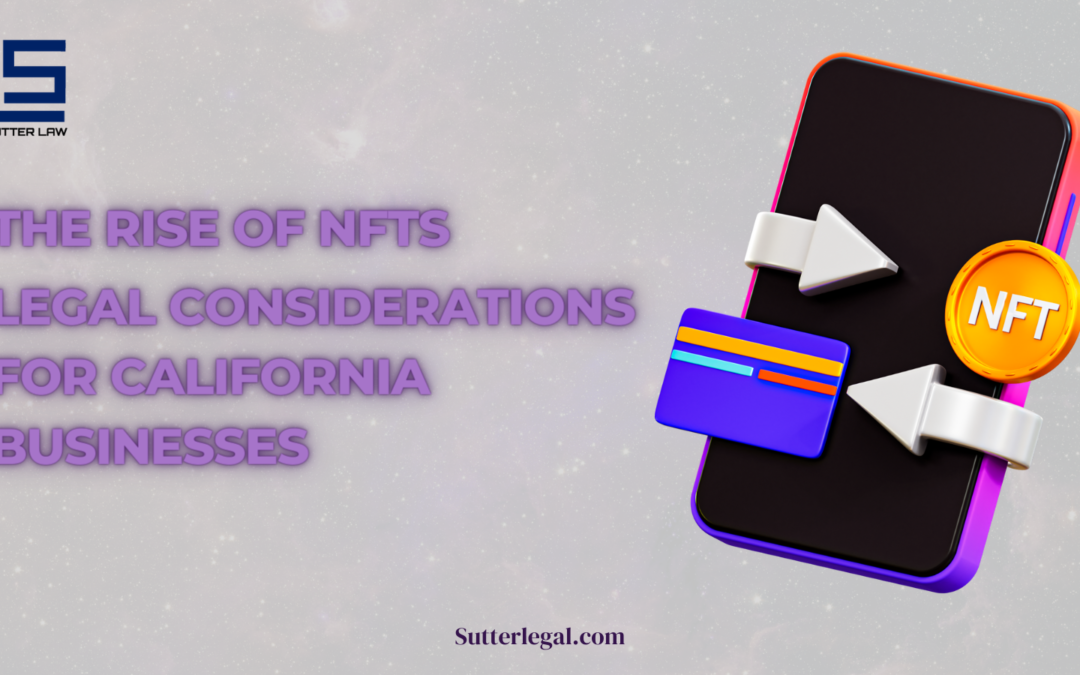Table of Contents
- What Are NFTs?
- Legal Framework in California
- Intellectual Property Considerations
- Tax Obligations
- Consumer Protection and Fraud
- Securities Law Implications
- Privacy Concerns
- Smart Contracts and Execution Risks
- Regulation of NFT Marketplaces
- Conclusion
In the dynamic landscape of digital assets, non-fungible tokens (NFTs) have emerged as a novel and powerful means of representing ownership and authenticity for a vast array of virtual and real-world assets.
This surge has not escaped the vibrant Venture Capital markets of California, where tech innovation meets a bustling creative economy.
Yet, while the growth in NFT trade signifies an economic opportunity for businesses, it also ushers in a series of complex legal considerations.
We will examine the legal terrain of NFTs and address the key issues that Startups must navigate to capitalize on this technological advancement while mitigating associated risks.
What Are NFTs?
NFTs are unique digital identifiers that cannot be copied, substituted, or subdivided, They are recorded on a blockchain and used to certify ownership and provenance of a particular asset.
Unlike cryptocurrencies such as Bitcoin, each NFT is distinct, with differing values and properties, hence the term ‘non-fungible.’ In principle, anything digital, including artwork, music, games, or videos, can be sold as an NFT, permanently linking ownership to the asset.
Legal Framework in California
As of now, the legal framework surrounding NFTs in California is nonexistent. California laws have yet to catch up with the pace at which NFTs have grown.
Nevertheless, businesses, startups and creators engaging in the NFT space need to be aware of several legal considerations to avoid potential legal pitfalls.
Intellectual Property Considerations
One of the foremost legal aspects to consider is that of intellectual property (IP) rights.
Acquiring an NFT typically does not confer the buyer with the underlying copyright to the asset unless explicitly stated.
Therefore, businesses need to tread carefully on IP rights negotiations, delineating what is being transferred beyond the NFT – whether it’s merely a license to use the asset, share it, or create derivative works.
Ensuring these details are clear within smart contracts is essential to prevent future disputes.
Tax Obligations
The taxation of NFT transactions poses another considerable challenge for California startups and NFT owners.
Currently, the Internal Revenue Service (IRS) treats NFTs as property for tax purposes, mirroring the treatment of cryptocurrencies.
Hence, NFT sales and trades may trigger capital gains taxes and reporting requirements.
NFT owners and Startup trading in NFTs must consider how to comply with state tax regulations in addition to federal rules.
Read Also: Building ChatGPT Platform with Sutter Law’s Expertise
Consumer Protection and Fraud
NFTs pose novel issues in the realm of consumer protection.
Misrepresentation, fraud, and the potential for money laundering are particular concerns.
California NFT owners and startups trading in NFTs should not only perform due diligence to ensure NFT authenticity but also maintain transparent records and communications to prevent any allegations of misleading or deceptive practices.
Securities Law Implications
An area of the law that cannot be ignored when dealing with NFTs is securities regulation.
Depending on the characteristics of the NFT and its associated rights, it could be classified as a security under federal law.
Such a designation would impose an array of registration, disclosure, and compliance obligations upon the issuer, typically a daunting task for businesses not accustomed to dealing in securities.
Privacy Concerns
Privacy issues often intersect with the use of blockchain technology inherent in NFT transactions.
Even though blockchain entries are encrypted, they are often public.
California NFT owners and startups trading in NFTs must be mindful of the California Consumer Privacy Act (CCPA) and ensure transactions adhere to privacy standards and the safeguarding of personal information.
Smart Contracts and Execution Risks
The automation of NFT transactions via smart contracts raises execution risks. Smart contracts are self-executing contracts with terms directly written into code.
While this can streamline transactions, any error in the code can be catastrophic, leading to unintended consequences.
Thus, it’s crucial to audit and test smart contracts to ensure they operate as intended.
Regulation of NFT Marketplaces
California’s legislature may also consider the regulation of online marketplaces where NFTs are bought and sold.
Businesses operating such platforms must ensure they adhere to consumer protection standards, anti-money laundering (AML) laws, and other relevant regulations.
Conclusion
The rise of NFTs holds exciting prospects for California’s economy, inviting businesses to partake in a groundbreaking digital market.
However, navigating the legal landscape requires a precise and informed approach.
California NFT owners and startups trading in NFTs must engage with business legal counsel well-versed in digital assets, IP law, tax law, and compliance to ensure they exploit the economic potential of NFTs while mitigating the risks presented by this fledgling technological phenomenon.
As the legal terrain solidifies, the business community’s proactive engagement with regulators and policymakers will be vital in shaping a supportive environment for NFTs to thrive.
Acknowledging the intersecting fields of technology, law, and commerce, California businesses are poised at the cusp of a new era, one that will redefine ownership and creativity in the digital age.
For Help Contact Sutter Law Legal team






